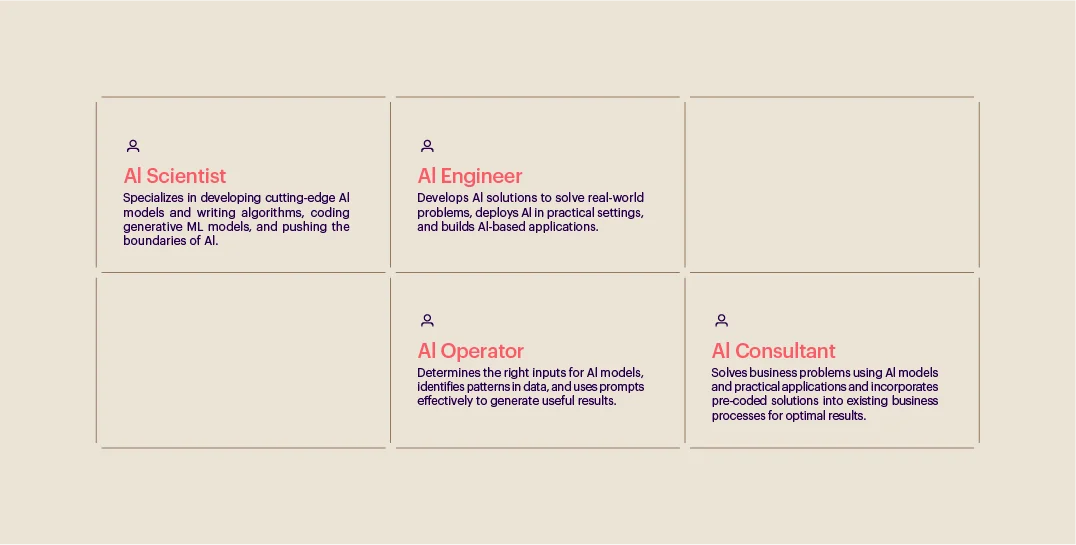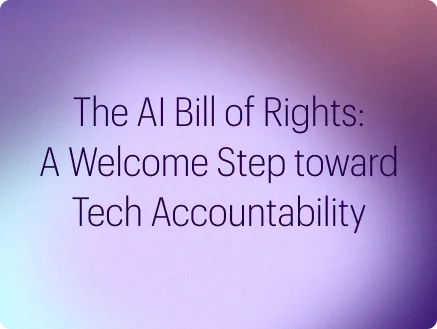As the prevalence of AI continues to increase, it is clear that the field of analytics needs to evolve to keep up with the rapid pace of change. While technological innovations make for good headlines, in order to generate real value from AI and deliver success, we will continue to require the right people in the right roles. In my view, this evolution will be driven by the emergence of four key roles that will become increasingly important. How these roles are defined will vary by industry and company. However, they will likely belong to one of these four broad roles:

The first of these roles is the AI scientist. This expert will specialize in developing AI models and writing algorithms. They are responsible for coding machine learning models that are generative in nature and building true AI models from the ground up . These folks are at the forefront of advancing the theoretical underpinnings of AI. The AI Scientist is critical in driving progress in the field and pushing the boundaries of what is possible. They will work closely with researchers and data scientists to develop cutting-edge AI models. They will design and implement neural network algorithms and use their deep understanding of AI theory to develop new models that push boundaries. The AI Scientist will need to stay up to date with the latest research and advances in the field to remain at the forefront of innovation.
The second role is the AI engineer. These professionals will have a deep understanding of the latest AI technologies. They will be able to develop solutions that apply AI models to real-world problems and devise solutions using the latest technologies. They will be experts in deploying AI in practical settings, such as building apps that summarize PDFs. The AI Engineer will play a key role in bringing AI out of the lab and into the real world. They will use these technologies to solve real-world problems and work closely with domain experts and business analysts to ensure effective usage of AI to achieve specific outcomes.
The third role is the AI operator. These experts will be responsible for determining the right inputs for AI models to obtain the desired output. They will have a deep understanding of using prompts effectively to generate useful results from AI models like Large Language Models (LLMs). They will work closely with AI Engineers and domain experts to determine what the right inputs required for each AI model are. The AI Operator will be skilled at identifying patterns in data and developing effective prompts that produce actionable insights. They will be critical in ensuring that AI is being used effectively and efficiently.
Finally, we have the AI consultant. These professionals will focus on solving specific business problems using AI models like LLMs. They will have a thorough understanding of how to incorporate pre-coded solutions into existing business process flows to achieve optimal results. The AI Business Consultant will be essential in creating practical, real-world applications for AI and ensuring that it is being used to drive business outcomes. They will work closely with stakeholders across the organization to identify areas where AI can improve business outcomes and will be responsible for ensuring that AI is being used effectively to achieve them.
In summary, these four roles will play an increasingly important role in the evolution of the field of analytics as AI becomes more prevalent. Each role will bring unique expertise and perspective to the table and will be crucial in unlocking the full potential of this transformative technology.
It is worth noting that while the rise of AI will create new roles, it will also change the way we think about existing roles. Data scientists, for example, will likely become a more generic term used to describe any of these four roles or a combination of them.
In conclusion, the emergence of these four roles represents an exciting opportunity for AI. As AI continues to advance and become more prevalent, these roles will become increasingly important in unlocking the full potential of this transformative technology. By working together, AI Scientists, AI Engineers, AI Operators, and AI Business Consultants will be able to develop practical, real-world solutions that drive the analytics field into its next stage of evolution.



